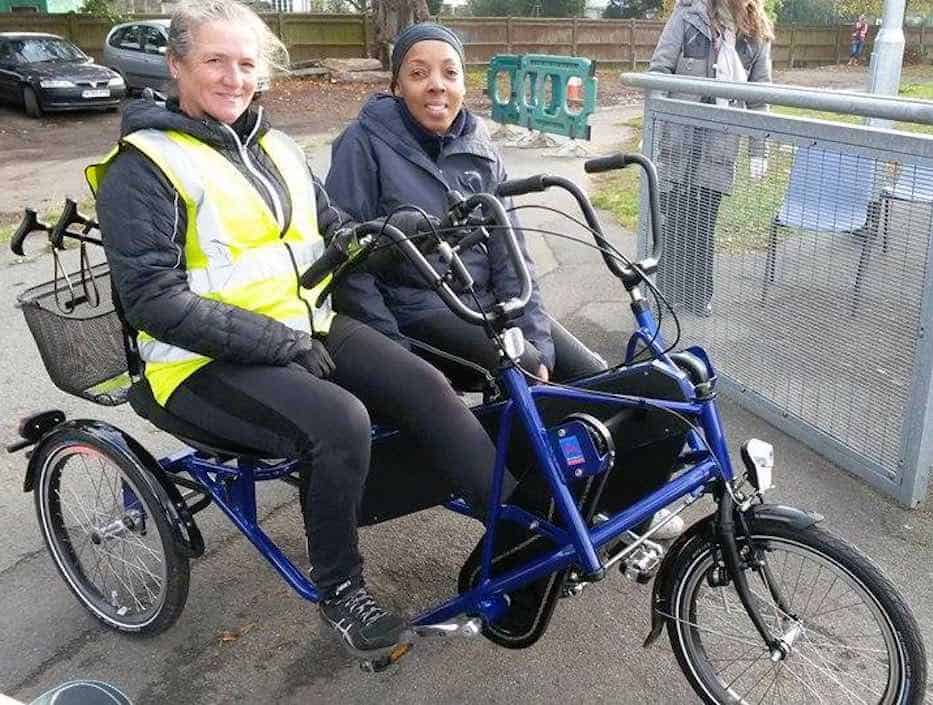Phoebe Scopes, who has MS, started coming to Wheels for Wellbeing’s cycling sessions in September 2016. After attending only one session, despite tiredness, she managed to slowly walk up the stairs – something she wasn’t able to do before! She continues cycling with us and talked to us about huge difference cycling has made in her circumstances.
Can you tell me about the first session you attended?
I drove to Herne Hill Velodrome feeling a bit anxious about getting there and it took me a while to find the venue. I remember getting on a bike and not knowing what to do! My brain just forgot how to pedal. I accepted that it would come to me at some point. So the first session was just about getting me on a trike and get me going.
What happened after that session?
I went home really exhausted but in the evening, as usual, I wanted to go upstairs. Normally, I kind of crawl and it’s difficult for me to go up the stairs. But that time my legs started walking – of course very slowly, but they suddenly remembered the movement. It proves that the nerves have memory. It was amazing.
After that you came back to the velodrome?
At the second session Jane (WfW volunteer) was just pushing me around the track and suddenly my brain started remembering what to do. My feet and ankles were cumbersome but I DID CYCLE. I did two laps on my own. Jane felt very emotional and shocked at the same time.
Had you cycled before being diagnosed with MS?
Last time I’d cycled before 2016 was in 2010. Before that, for about 10 years I cycled for commute and for leisure. I was doing at least 10 miles a day. I also used to box – for 13 years. In 2009 I still did 100km trek through Sahara. I loved dancing.
But you were diagnosed with MS in 2008?
Yes, I was diagnosed with MS early in 2008 based on the symptoms. They weren’t very visible that time, so I didn’t really believe the diagnosis. I saw people with MS on wheelchairs but mine wasn’t that advanced, so I kind of never believed in it. I thought they were wrong. I also didn’t know what MS was.
Even after the diagnosis, I continued to maintain my previous level of physical activity, still cycling every day. I did everything as normal until 2010 when I had an accident. I fell off my bike. That was really the starting point of the disease. But even then people around me wouldn’t know I had MS. I wasn’t using a cane and if I felt any pain I was saying that I’d hurt my back. I still was thinking I would make a full recovery. And I didn’t talk about it either.

In 2011 I started losing my balance and was using one cane. By 2012 I was using two. I did have thoughts that I won’t be able to exercise anymore but I’ve never thought or believed that that was it. That would make me really depressed..
Physical activity was always in my mind and I was thinking that I would one day be able to cycle again but I wasn’t aware of inclusive cycling at all.
So how did you first hear about Wheels for Wellbeing?
It was in August 2016. I was in Clapham Common which is my local park. I usually go there to walk 15-20 metres to get some fresh air. As I sat on a bench a gentleman cycled up to me and invited me to join. He was from CT UK and they were having Positive Spin (cycling for people with dementia) event that day at the park. He told me about Wheels for Wellbeing.
What difference do you feel between now and before you started cycling?
It’s a massive difference. I need to be moving, otherwise I stiffen up and cycling is perfect for that. I love driving and use my car a lot but cycling is different. It gives you freedom, like nothing else. You can go places and get out and about. Cycling is easier than walking for me.
Why do you think cycling makes such a difference to people with MS?
I believe that muscles have memory. Not just the muscles in legs or hands but muscles like brain. For other people with MS and other conditions affecting mobility, it’s important to do the things regularly and keep moving. If you do, the muscles will get their memory back. If you do it frequently the memory will become stronger.
Apart from that, cycling is good for your heart and general cardiovascular health. It’s brilliant.
Thank you.
Have you felt inspired by Phoebe’s story? Do you have MS or do you know somebody who does? Come to one of our sessions or bring them along and we’ll help you to get started.
